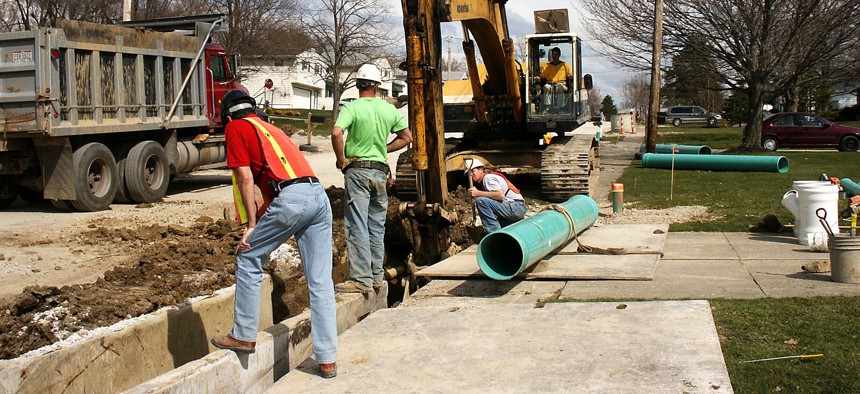Connecting state and local government leaders
“There is nobody outside that’s going to pay for this and not expect to be paid back,” said one panelist at the National Conference of State Legislatures' summit.
Coming up with the billions of dollars needed to fix America’s decaying water and sewer infrastructure is going to require substantial investments at the state and local level, experts emphasized during a panel discussion in Chicago on Wednesday.
There’s an estimated $105 billion shortfall over the next decade in the amount of money needed to bring the nation’s water and wastewater systems into a state of good repair, Gregory DiLoreto, a past president of the American Society of Civil Engineers, said during the event.
“Most of these costs are going to be borne by local government and state government,” said DiLoreto, also the former chief executive of the Tualatin Valley Water District in Oregon. “At the end of the day, it is the users of the system that pay for it,” he added. “There is nobody outside that’s going to pay for this and not expect to be paid back.”
The panel was held as part of the National Conference of State Legislatures, 2016 Legislative Summit.
Conversations about paying for water infrastructure can be complicated by the fact that, unlike cell phone or cable television service, water is essential for survival. And jacking up rates beyond levels that are affordable for less affluent customers can quickly become problematic.
These days, DiLoreto said there are around 240,000 water main breaks each year in the U.S. Such breaks, and other factors, contribute to the loss of about 2 trillion gallons of water annually, he noted.
“We’ve already paid to have this water treated, and we’ve lost it,” DiLoreto said.
Chris Kolb is president of the Michigan Environmental Council, a nonprofit coalition, and served on a task force that investigated severe problems involving lead in Flint, Michigan’s drinking water. “Flint might be sort of a really extreme example,” he said during the panel event. But Kolb added: “I’ve come to the conclusion that what happened in Flint could happen in other places.”
He made reference to 2,000 water systems in the U.S., serving over six million people, that have high lead levels. “We know that this is an issue across the country,” Kolb said.
The problems don’t end with water main breaks and lead risks.
Kolb highlighted a situation in Toledo, Ohio, during 2014, when residents were told not to use their tap water, due to a toxic algae bloom in Lake Erie. Concerns have also simmered in a number of states this year over possible water contamination from a chemical known as perfluorooctanoic acid, or PFOA, once widely used to make Teflon pans and other products.
It’s not realistic to think federal dollars can provide all the money needed to fix the nation’s waterworks and sewers, according to John Covington, a senior financial analyst with the U.S. Environmental Protection Agency’s Water Infrastructure and Resiliency Finance Center.
“There has to be a state investment,” Covington said during the panel discussion. “Every level of government is going to have to step up.”
Despite historically low interest rates in recent years, he noted, many government entities have remained reluctant to borrow money to upgrade infrastructure. Proposals for utility rate hikes and tax increases to pay for borrowing can encounter deep public skepticism.
“It’s one thing to say: ‘we need more money for water and sewer,’” Covington said. “It’s another issue to say: ‘where is that money coming from?”
While communities tend to prefer grant funds, as opposed to loans, he pointed out that there is typically a much greater capacity to get projects done when money is borrowed. Covington highlighted the need for other levels of government to assist smaller utilities that can be under-equipped to borrow money through the bond market, or from state and federal programs.
Encouraging “regionalization” among water systems, which number in the thousands in some states, is another important step he said state policymakers can take -- as is allowing utilities to customize rates, and to create customer assistance programs for lower income communities.
The Environmental Protection Agency, Covington said, is working toward the implementation of the Water Infrastructure Finance and Innovation Act, part of legislation President Obama signed in 2014. The program will provide low interest rate financing for the construction of water and wastewater infrastructure projects expected to cost $20 million or more.
“Every indication,” according to Covington, is that EPA will receive funding in the next federal budget to begin making loans through the program, totalling between $2 billion and $4 billion.
In Kolb’s view, getting the nation’s water systems up to snuff will take a broad-based effort. Michigan, he explained, is moving to incorporate citizen advisory councils into water planning.
“If we are going to really collectively get our hands around this,” he said, “we need to involve our residents.”
Bill Lucia is a Reporter for Government Executive’s Route Fifty and is based in Washington, D.C.

NEXT STORY: Taking a ‘Pie-in-the-Sky Idea’ and Moving It to Real Municipal Practice




